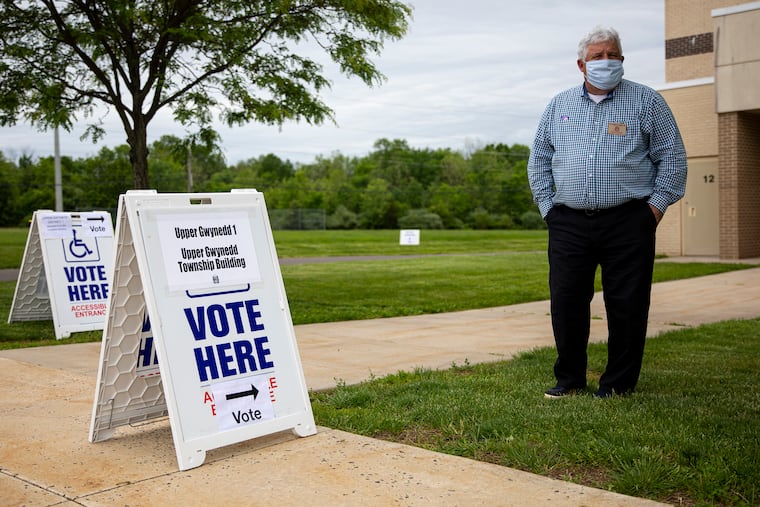How to become a poll worker for the November election (and make up to $250 to do it)
You can volunteer to be a paid poll worker on election day. Here's what's involved.

Since March, Michael Kauffman, 28, has been erring on the side of caution. Other than visiting his parents and brothers, he seldom leaves his South Philly apartment. He sees friends maybe once a month, always outdoors, with everyone wearing masks and sitting six feet apart.
But last week, Kauffman made plans to break his pandemic safeguards.
With less than 50 days until Election Day, Kauffman applied to become a poll worker. If accepted, he’ll help play a role in moving crowds of people through the voting process. It’s worth it, he says, including the sacrifice he plans to make afterward — a voluntary two-week self-quarantine.
“This is one of those times where stepping up might outweigh the risks,” says Kauffman. “It’s an extremely important election, and I just don’t want people to be disenfranchised.”
» READ MORE: Everything you need to know about voting in Pennsylvania in November
Poll worker shortages were a problem well before the pandemic. And now, the challenge is even greater. Without enough poll workers, lines get longer, polling places are forced to close, and this makes it harder, more frustrating, and, for some, impossible to vote.
Want to help (and get paid for it, too)? Here’s what you need to know.
Why become a poll worker?
Philadelphia alone needs about 8,500 poll workers to staff its 800 polling centers, and while millions of Pennsylvanians have applied to vote-by-mail, a high turnout at the polls is still expected on Nov. 3.
But, there’s a problem. Traditionally, poll workers are largely older. In the 2018 general election, almost 60% of U.S. poll workers were 61 or older, and roughly a quarter (27%) of those were over 70, according to a Pew Research Center analysis of government data.
That doesn’t play well with the coronavirus. Seniors are considered to be at higher risk for severe illness, and the Centers for Disease Control and Prevention says that eight out of 10 COVID-19 deaths reported in the U.S. have been adults 65 years and older. Many former poll workers are expected to sit this year out. Finding others to fill those poll worker spots is critical.
Election officials are working to make polling places as safe as possible. And there’s a large push this year to recruit new, and younger, poll workers.
» READ MORE: You — yes, you! — should sign up to be a poll worker right now | Opinion
Do I get paid?
Choose to volunteer, and there’s an added bonus: money. Many jurisdictions pay poll workers for Election Day hours and also training. Pay rates vary.
In Philadelphia, for example, you’re paid $200 for working a full Election Day, and $50 for training. In Montgomery County, you’re paid $110 for a full day and $55 for a half day. In Burlington County, you’re paid $200 for a full day.
Who can sign up?
Most states require you to be a registered voter and citizen to volunteer. In Pennsylvania, you must be registered to vote in the county where you wish to sign up. (There are exceptions for 17-year-old high school students. Interested high school students should contact their county election office for more information.)
Government officials and employees are not allowed to serve as poll workers, with a few exceptions (district judges, notaries public, and members of the Pennsylvania National Guard). If your name appears on the ballot, you’re generally not allowed to serve as a poll worker.
In New Jersey, you must be a registered voter or high school student at least 16 years of age, and a resident of the county where you wish to sign up.
In both states, training is provided and often required. You should be available to work the entire Election Day, often from the hour before polls open until after they close. (Poll hours in Pennsylvania are 7 a.m. to 8 p.m., and in New Jersey, 6 a.m. to 8 p.m.). Some jurisdictions offer half-day shifts. English language skills are required, and bilingual proficiency is a plus.
What will my job be?
Your role may include helping voters check in, managing lines and social distancing, and making sure voters understand their ballots and how to use the voting machines. Some poll workers will help set up machines and close the polls at the end of the day.
» READ MORE: ‘It’s satisfying every time.’ Meet 5 Philly-area poll workers who live and breathe Election Day democracy | Opinion
How do I sign up?
In Pennsylvania, you can fill out an application through the Pennsylvania Department of State at expressforms.pa.gov/apps/pa/DOS-VotesPA/County/. Once you enter your address, they send your information to the county election office where you live. You can also call 1-877-VOTESPA (1-877-868-3772). If you live in Philadelphia, you can apply directly through the Office of the City Commissioners at philadelphiavotes.com/en/election-board-officials/pollworker.
In New Jersey, a statewide application is available through the Department of State’s Division of Elections at nj.gov/state/elections/pollworker.shtml.
And no matter where you live, you can apply through Power the Polls, a nonpartisan effort to recruit poll workers in 2020. Type in your contact information and zip code, and you’ll be connected to your local jurisdiction’s application form.
» READ MORE: FAQ: Want to be a poll worker for the 2020 election? Here’s what you need to know.